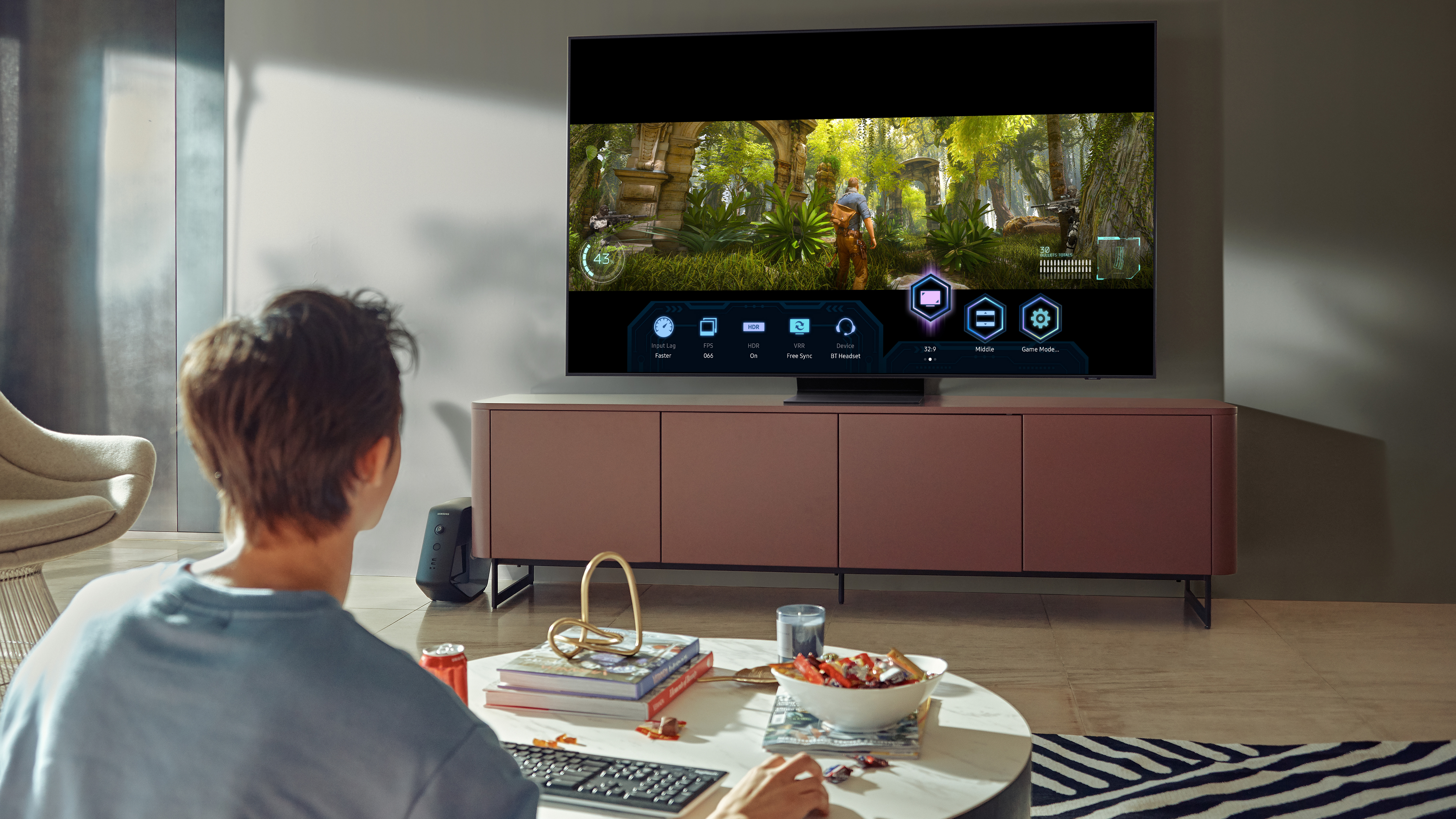Is Samsung finally making an OLED TV? Not so fast
Rumors suggest Samsung is buying millions of LG OLED panels, but Samsung OLED TVs may not be a sure thing.

Is Samsung jumping into OLED TVs? A recent rumor claims that a deal between Samsung and LG Display would partner the two Korean rivals to use LG panels to produce millions of Samsung OLED TVs.
According to reports from Korean Broadcaster MTN and tech site Sammobile, high-level Samsung and LG Display executives recently met to hash out a deal in which Samsung would buy as many as 5 million OLED TV panels between 2021 and 2022, suggesting a major change to the Samsung TV lineup.
But how much reality is there to that rumor, and what might a line of Samsung OLED TVs do to change the TV industry?
- See all of the best TVs we've reviewed
- Something for everyone: Our favorite Samsung TVs
- Plus: More stimulus check payments on the way this week
Is there any truth to the rumors?
To find out more about this potential deal, we spoke to Bob O'Brein of Display Supply Chain Consultants (DSCC). His take? O'Brein says "I still believe that the rumored deals will not happen."
He cited past rumors and a history of animosity between the two companies that have not only competed for TV shopper's dollars, but have competed on features, technologies, and more. The biggest take away? It's still pretty hard to believe that Samsung and LG would bury the hatchet after being intense rivals for many years.
"This particular deal seems doubtful because it goes against years of Samsung TV marketing" says O'Brein. Pointing to past marketing pushes that have called out flaws in OLED and QLED technologies, O'Brein doesn't see them doing an about face any time soon.
"It would mean Samsung acknowledging the superiority of OLED for TV, which they have never done thus far."
Sign up to get the BEST of Tom's Guide direct to your inbox.
Get instant access to breaking news, the hottest reviews, great deals and helpful tips.
Samsung targeting OLED
While Samsung has never openly said anything about OLED's superior quality, the company clearly has OLED in its sights. Samsung has been chipping away at the dominance of OLED for a few years now, first by embracing QLED, which elevates LCD performance well above the capabilities of a standard LED TV, and bringing premium LCD panel-based TVs much closer to OLED quality with better color and brightness, as well as improved HDR performance.
But as quantum-dot technology has gone from Samsung exclusive to showing up on many relatively mainstream offerings, Samsung has turned up the volume on all of it's other display technologies.
The biggest of these is microLED, which will finally be available to purchase this year and takes on OLED head to head with similar per-pixel illumination. But the potentially game-changing tech may not have much impact this year, seeing as it's more expensive than a garageful of Ducati motorcycles.
Samsung's NeoQLED TVs are a much more approachable product, but still provide a solid (and affordable) alternative to OLED. By combining the color boosting properties of QLED with the tighter brightness and dimming control of mini-LED backlighting, Samsung's new NeoQLED 4K and 8K TVs offer the next evolutionary step in LCD display technology.
What would a Samsung OLED TV look like?
While the idea of a Samsung OLED TV is appealing – marrying Samsung's great Tizen smart TV software with the crisp black levels and razor sharp clarity of OLED would make for an impressive TV – it's unlikely that it would be sold for the affordable prices that have helped make Samsung the number 1 TV manufacturer on the market.
"Samsung will need to pay for panels at a much higher price than LG Electronics," said O'Brein, "so they will need to market the TV products at a substantial premium to LG's OLED offerings. Samsung would compete with Sony, potentially taking some of that business away."
Competing with Sony would mean delivering exceptional quality, but also some of the most premium prices in 4K smart TVs. Sony's latest, the Master Series A90J promises to be one of the best TVs ever made, but it starts at $2,999 for a 55-inch TV and goes up from there, easily outpacing popular OLED models like the LG C1 OLED, which sells the newest 55-inch model for $1,799.
That's an especially interesting thought when one considers that the OLED space has also gotten more competitive in the most affordable models. The entry-level 55-inch Vizio OLED starts with a regular retail price of $1,299, and has even dipped below the $1,000 mark during sales.
What would Samsung OLED TVs mean for the TV market?
Samsung made one of the first OLED TVs back in 2013, and OLED screens are used on all sorts of smaller Samsung devices, but will we ever see a new Samsung OLED TV?
Of all the ripples that might be caused in the TV industry by a partnership between Samsung and LG and the resulting Samsung OLED TV, the biggest hit might come to Samsung's biggest models – the recently launched Neo QLED line, which combines traditional quantum dot enhancement with mini-LED backlighting, and represents Samsung's best-of-the-best across both 4k and 8K models.
"A Samsung/LGD [LG Display] deal would dampen the prospects for Mini-LED TVs," says O'Brein, referring to the 2021 trend toward using mini-LED backlight to offer more discrete dimming zones and better HDR performance.
Competitor TCL introduced mini-LED-lit TVs in 2019 and 2020, and Samsung's embrace of the new technology for its flagship models shows that the company had to pivot to meet that increased competition for affordable picture quality. Not to be left out, LG is also launching it's own mini-LED TV line, called QNED Mini-LED TVs, though it's still holding out OLED as the superior product.
"If Samsung goes OLED," says O'Brein, "these Mini-LED products get pushed to a second tier." That's a big change for several TV manufacturers, including Samsung, who have bet big on mini-LED to elevate their premium and mid-range TV offerings. For Samsung to risk making its own top-tier TVs less appealing just doesn't sound like a viable move for the company to make.
But then again, Samsung has OLED ambitions of its own. The manufacturer is developing a new TV technology that merges the gorgeous picture of OLED with the superior brightness and color of quantum dots, into a new hybrid technology called QD-OLED. Samsung's own display division is investing heavily into the new tech, but there's no word yet on when a Samsung QD-OLED TV might make it to stores.
Will we see Samsung TVs using LG OLED panels in 2022? Maybe, maybe not. But the possibility of a Samsung OLED TV, that's only a matter of time.
Brian Westover is currently Lead Analyst, PCs and Hardware at PCMag. Until recently, however, he was Senior Editor at Tom's Guide, where he led the site's TV coverage for several years, reviewing scores of sets and writing about everything from 8K to HDR to HDMI 2.1. He also put his computing knowledge to good use by reviewing many PCs and Mac devices, and also led our router and home networking coverage. Prior to joining Tom's Guide, he wrote for TopTenReviews and PCMag.

